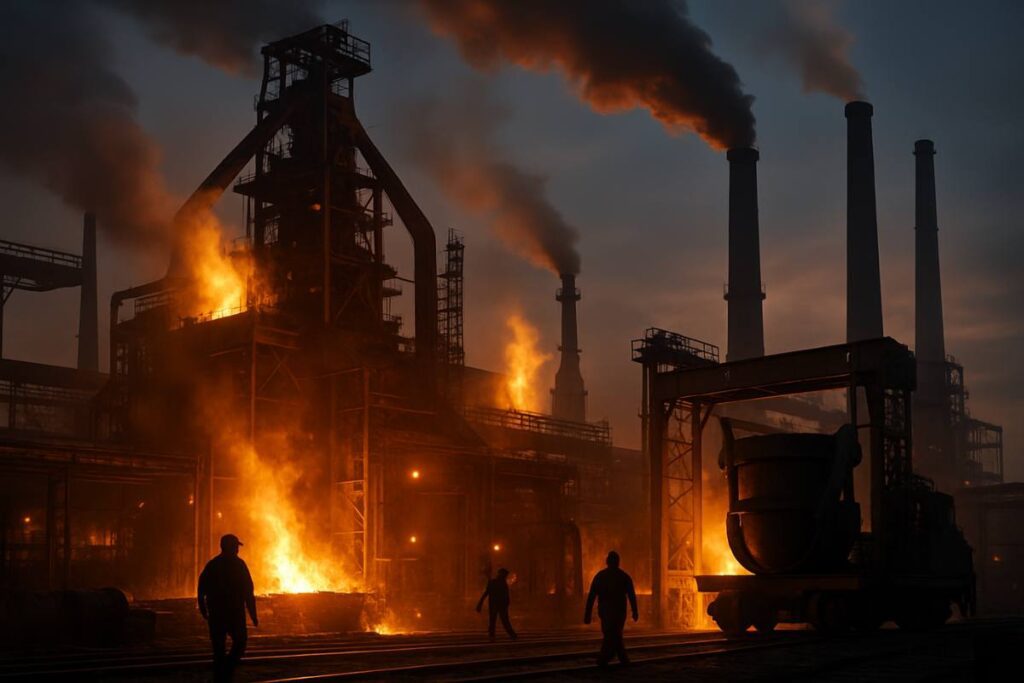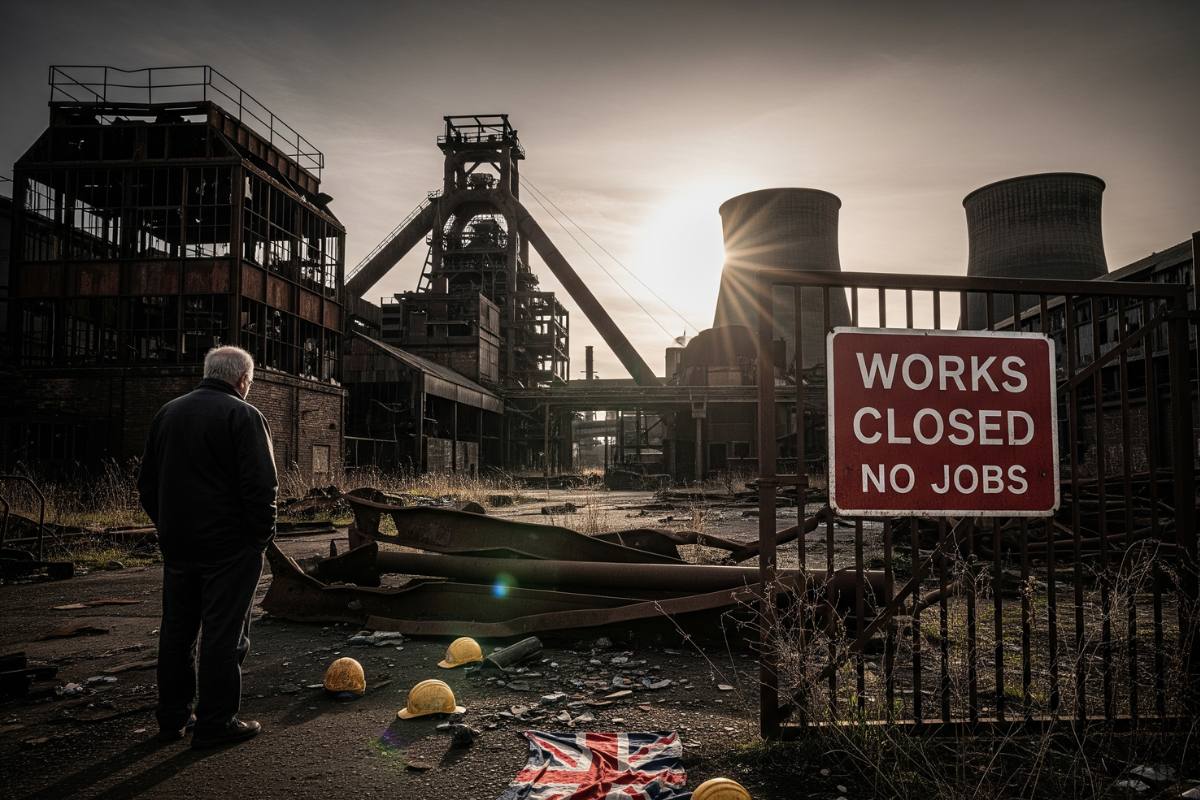ROTHERHAM, ENGLAND – In a dramatic move that underscores the deepening crisis within Britain’s foundational industries, the UK government has taken control of the nation’s third-largest steel producer, Speciality Steel UK. The company, a key part of the industrial landscape in South Yorkshire, collapsed into compulsory liquidation, placing the future of nearly 1,500 workers in Rotherham and Stocksbridge into grave uncertainty.
The government’s intervention, confirmed on Thursday, means the Official Receiver will now manage the affairs of the beleaguered company, which was formerly a segment of Sanjeev Gupta’s sprawling GFG Alliance and its Liberty Steel business. It’s a stark development, one that paints a troubling picture of the health of UK manufacturing and has triggered a blame game between the former owners, unions, and Whitehall.
And for those watching the sector closely, it feels like déjà vu. Believe it or not, this is the second time in a matter of months that the government has been forced to step in and rescue a major steel manufacturer, following the emergency takeover of British Steel in April.
The Anatomy of a Collapse: A Financial House of Cards

The tipping point for Speciality Steel UK wasn’t a single event, but the culmination of a slow-burning crisis. The company found itself in an impossible financial position. Court documents from the specialist insolvency hearing painted a grim picture: millions of pounds owed to creditors, with a paltry £650,000 sitting in the company’s bank account. It was, for all intents and purposes, insolvent.
On Thursday, the courts made it official, granting a compulsory winding-up order, the final nail in the coffin for the company in its current form.
Here’s the kicker: this forces the government’s hand. To prevent an immediate and chaotic shutdown that would decimate local communities, the state has agreed to step into the breach. For now, taxpayer money will cover the ongoing wages of the 1,450 employees and the plant’s operational costs. The goal? To keep the lights on and the furnaces warm just long enough to find a buyer willing to take on the challenge.
A government spokesperson attempted to calm the waters, stating, “We know this will be a deeply worrying time for staff and their families, but we remain committed to a bright and sustainable future for steelmaking and steelmaking jobs in the UK”. A vital promise, but one that will be tested in the difficult months ahead.
A War of Words: “Irrational” Decisions and “Chronic Mismanagement”
While workers and their families digest the news, the battle over who is responsible for this industrial catastrophe has already begun. And the two sides could not be further apart.
GFG Alliance, the parent business of Liberty Steel, came out swinging. They labeled the decision to force the company into liquidation as utterly “irrational”. Jeffrey Kabel, the group’s chief transformation officer, argued that a viable alternative was on the table.
According to Kabel, GFG had presented a rescue plan to the court that would have saved the business. He claimed this proposal was backed by “the world’s largest asset manager” and would have secured fresh investment, protected jobs, and established a stable, sustainable future under a new, independently overseen management structure.
His pointed accusation: “Instead, liquidation will now impose prolonged uncertainty and significant costs on UK taxpayers for settlements and related expenses, despite the availability of a commercial solution”. It’s a bold claim that a private sector solution was ignored in favor of a state-managed wind-down.
But the unions see a very different story. For them, this collapse is the predictable result of years of poor leadership.
Charlotte Brumpton-Childs, a National Officer for the GMB union, called the situation “another tragedy for UK steel,” laying the blame squarely at the feet of the owners. “This time brought on by years of chronic mismanagement by the owners,” she said, mincing no words.
The GMB isn’t just pointing fingers, though. They see this crisis as an opportunity. A chance for the government to do more than just apply a temporary patch. “This represents an opportunity for the Government to take decisive action, as it did with British steel, to protect this vital UK industry,” Brumpton-Childs added.
Echoes of Scunthorpe: A Pattern of State Intervention
You can’t understand the significance of what’s happening in Rotherham without looking back just a few months to April 2025, and a similar crisis that unfolded in Scunthorpe. There, the government invoked emergency powers to take control of British Steel, the country’s largest steelworks, from its Chinese owner, Jingye Group.
The situation was dire. Jingye, citing daily losses of £700,000, was threatening to shut down the plant’s two blast furnaces. These weren’t just any furnaces; they were the last two in the entire United Kingdom capable of primary steel production, making steel from raw iron ore.
The funny thing is, once a blast furnace is shut down, restarting it is extraordinarily expensive and technically difficult. Sometimes, it’s impossible. Letting them go cold would have effectively ended the UK’s sovereign capability to produce virgin steel, making the nation the only G7 economy without it. It was a prospect the government deemed a threat to national security and its entire economic agenda, which relies on steel for everything from housing to railways and defense.
So, in an almost unprecedented Saturday session, Parliament was recalled from its Easter break to rush through the “Steel Industry (Special Measures) Act 2025”. The act gave the government sweeping powers to intervene, take control of assets, and keep the furnaces running, with nationalization flagged as a likely next step. Prime Minister Keir Starmer called the move essential to “safeguard jobs” and ensure that domestically produced steel would be the “foundation as we get Britain building again”.
Now, just four months later, the same playbook is being run for Speciality Steel UK. It establishes a clear, if unsettling, precedent: when a major steel producer is on the brink, the government is willing to become the owner of last resort.
The Human Toll: A Cloud Over South Yorkshire
Beyond the corporate statements and political maneuvering lies the raw human cost of this collapse. For the 1,500 people who work at the plants in Rotherham and Stocksbridge, and the thousands more in the local supply chain, this is a moment of profound fear and anxiety.
Steel isn’t just an industry in South Yorkshire; it’s woven into the very fabric of the community’s identity and economic life. It’s a legacy passed down through generations. The government’s assurance that it will cover wages provides some immediate relief, but the fundamental question, Will I have a job in six months?, remains unanswered.
The search for a new buyer is now the single most important task for the Official Receiver and the special managers appointed from the consultancy firm Teneo. But let’s be honest, finding one won’t be easy. The global steel market is notoriously difficult, squeezed by high energy costs, fierce international competition, and the immense capital investment needed to transition to greener, more modern production methods.
Any potential buyer will need deep pockets and a genuine, long-term commitment to the UK.
A Crossroads for British Industry: What Is the Plan?
This latest crisis does more than just threaten one company. It forces a national conversation about the UK’s entire industrial strategy. For years, critics have argued that successive governments have failed to provide the long-term vision and support necessary for foundational industries like steel to thrive.
The government insists it is committed. Business and Trade Secretary Jonathan Reynolds recently declared, “This Government is unapologetic in our support for the UK steel sector, it underpins Britain’s industrial strength, our national security, and our status as a global power”.
To back this up, they point to new trade measures introduced in July to protect domestic producers from surges in cheap imports and have promised a new, comprehensive “Steel Strategy” to be published later this year. These are welcome steps, but for the workers in Rotherham, they may feel like they’re coming too late.
The immediate future of Speciality Steel UK now rests in the hands of civil servants and consultants, funded by the public purse. The long-term survival of the plants, and the livelihoods they support, depends entirely on the outcome of a high-stakes hunt for a saviour. For the second time this year, the British steel industry finds itself on life support, leaving a nation to wonder: what will it take to finally secure its future?






















